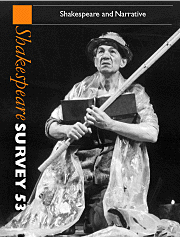Book contents
- Frontmatter
- Shakespeare’s Narremes
- Stepping Out of Narrative Line: A Bit of Word, and Horse, Play in Venus and Adonis
- A ‘consummation devoutly to be wished’: The Erotics of Narration in Venus and Adonis
- Echoes Inhabit a Garden: The Narratives of Romeo and Juliet
- A Midsummer Night’s Dream: Comedy as Apotrope of Myth
- Plutarch, Insurrection, and Dearth in Coriolanus
- Shakespeare, Crossing the Rubicon
- Vernacular Criticism and the Scenes Shakespeare Never Wrote
- The Shadow of Lear’s ‘Houseless’ in Dickens
- Shakespearian Margins in George Eliot’s ‘working-day world’
- In Her Father’s Library: Margaret Fuller and the Making of the American Miranda
- The Magician in Love
- Narrative Approaches to Shakespeare: Active Storytelling in Schools
- Monsters, Magicians, Movies: The Tempest and the Final Frontier
- Shakespeare’s Self-Repetitions and King John
- Inside Othello
- The View of London from the North and the Playhouses in Holywell
- Measured Endings: How Productions from 1720 to 1929 Close Shakespeare’s Open Silences in Measure for Measure
- Shakespearian Utopias
- Shakespeare Performances in England, 1999
- Professional Shakespeare Productions in the British Isles January–December 1998
- The Year's Contributions to Shakespearian Study 1 Critical Studies
- 2 Shakespeare’s Life, Times, and Stage
- 3 Editions and Textual Studies
- Books Received
- Index
A Midsummer Night’s Dream: Comedy as Apotrope of Myth
Published online by Cambridge University Press: 28 March 2007
- Frontmatter
- Shakespeare’s Narremes
- Stepping Out of Narrative Line: A Bit of Word, and Horse, Play in Venus and Adonis
- A ‘consummation devoutly to be wished’: The Erotics of Narration in Venus and Adonis
- Echoes Inhabit a Garden: The Narratives of Romeo and Juliet
- A Midsummer Night’s Dream: Comedy as Apotrope of Myth
- Plutarch, Insurrection, and Dearth in Coriolanus
- Shakespeare, Crossing the Rubicon
- Vernacular Criticism and the Scenes Shakespeare Never Wrote
- The Shadow of Lear’s ‘Houseless’ in Dickens
- Shakespearian Margins in George Eliot’s ‘working-day world’
- In Her Father’s Library: Margaret Fuller and the Making of the American Miranda
- The Magician in Love
- Narrative Approaches to Shakespeare: Active Storytelling in Schools
- Monsters, Magicians, Movies: The Tempest and the Final Frontier
- Shakespeare’s Self-Repetitions and King John
- Inside Othello
- The View of London from the North and the Playhouses in Holywell
- Measured Endings: How Productions from 1720 to 1929 Close Shakespeare’s Open Silences in Measure for Measure
- Shakespearian Utopias
- Shakespeare Performances in England, 1999
- Professional Shakespeare Productions in the British Isles January–December 1998
- The Year's Contributions to Shakespearian Study 1 Critical Studies
- 2 Shakespeare’s Life, Times, and Stage
- 3 Editions and Textual Studies
- Books Received
- Index
Summary
Hippolyta, I wooed thee with my sword
And won thy love doing thee injuries.
But I will wed thee in another key - With pomp, with triumph, and with revelling.
(1.1.16-19)Thus Theseus, benignly, to Hippolyta in the opening scene of A Midsummer Night's Dream. Everyone watching, in 1595 or 1596, would have known that the speaker was an important personage. He enters, splendidly dressed (we may be certain) and, according to the Folio stage direction, 'with others' (rightly interpreted by Theobald as implying a train of attendants). His speech contrives, within a small compass, to be stately. It at once receives from Egeus, a kind of underlining, a graceful, articulate equivalent of loyal (servile?) applause: 'Happy be Theseus, our renowned Duke.' Now we are clearly aware of the exact social status of Theseus, which is of course very high. The cadence of Egeus' words anticipates that of the courtier Amiens in As You Like it, 'Happy is your grace', after Duke Senior's similarly stately (if deeply implausible) speech on the merits of the simple life, although, interestingly, Amiens' 'happy' carries, as Egeus' 'happy' does not, a connotation of stylistic felicity. Theseus, then, is a grand fellow of whom we should all take notice. Do we know anything else? Do we know - to put the question more precisely - who he is?
- Type
- Chapter
- Information
- Shakespeare SurveyAn Annual Survey of Shakespeare Studies and Production, pp. 49 - 59Publisher: Cambridge University PressPrint publication year: 2000
- 3
- Cited by

